
The Communist Party of India (Marxist) is a communist political party in India. It is the largest communist party of India in terms of membership and electoral seats and one of the national parties of India. The party emerged from a split in the Communist Party of India (CPI) on 7 November 1964. As of 2022, CPI(M) is a part of ruling alliances in three states — the Left Democratic Front in Kerala, Mahagathbandhan in Bihar, and the Secular Progressive Alliance in Tamil Nadu. CPIM has representation in the legislative assemblies of 9 states.

The Communist Party of India (CPI) is the oldest communist party in India and one of the eight national parties in the country. The CPI was founded in modern-day Kanpur on 26, December 1925.

The Samajwadi Party is a socialist political party in India, headquartered in New Delhi. It is mainly based in Uttar Pradesh, with significant presence in other states as well. With a secular and democratic ideology, the Samajwadi Party believes in creating a socialist society, which works on the principle of equality. In the 2022 Uttar Pradesh Legislative Assembly election, the party won a 32.06% vote share with 111 seats, the highest vote share in party history. The party was able form the government 3 times, with one full majority since 2012 in the Uttar Pradesh Legislative Assembly. The party was fifth-largest by vote share since the 2019 general elections but it acquired fewer seats as compared to other parties due to the constituency-based electoral system.

The All India Forward Bloc is a left-wing nationalist political party in India. It emerged as a faction(a small organized dissenting group within a larger one, especially in politics). within the Indian National Congress in 1939, led by Subhas Chandra Bose. The party re-established as an independent political party after the independence of India. It has its main stronghold in West Bengal. The party's current Secretary-General is Debabrata Biswas. Veteran Indian politicians Sarat Chandra Bose and Chitta Basu had been the stalwarts of the party in independent India.
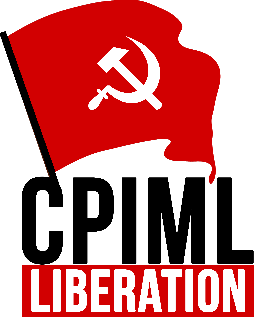
The Communist Party of India (Marxist–Leninist) Liberation also referred to as the Liberation Group, is a Communist political party in India.
The Indian People's Front (IPF) was a mass front organisation founded in Delhi between 24–26 April 1982. It was conceptualised by Vinod Mishra and it was operated as the open mass front of the CPIML Liberation between 1982–1994. The front primarily worked for the social and economic upliftment of Adivasis, Dalits and impoverished sections of society and mobilised them through the means of unions, rallies and conventions.

All India Kisan Sabha, is the peasant or farmers' wing of the Communist Party of India, an important peasant movement formed by Sahajanand Saraswati in 1936.
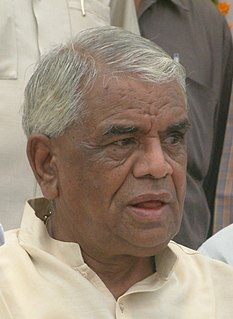
Babulal Gaur Yadav was an Indian politician from Bharatiya Janata Party (BJP) who served as the 16th Chief Minister of Madhya Pradesh. He was elected ten times to the Madhya Pradesh Legislative Assembly, twice from Bhopal South and eight times from Govindpura. He retired from electoral politics in 2018 due to old age.
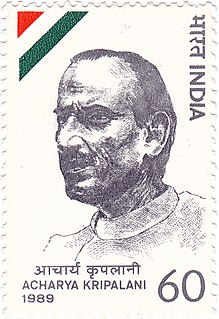
Jivatram Bhagwandas Kripalani, popularly known as Acharya Kripalani, was an Indian politician, noted particularly for holding the presidency of the Indian National Congress during the transfer of power in 1947 and the husband of Sucheta Kripalani. Kripalani was an environmentalist, mystic and independence activist who was long a Gandhian socialist, before joining the economically right wing Swatantra Party later in life.
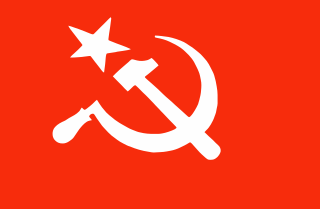
The Socialist Unity Centre of India (Communist) or SUCI(C), previously called the Socialist Unity Centre of India and "Socialist Unity Centre" is an anti-revisionist Marxist-Leninist communist party in India. The party was founded by Shibdas Ghosh, Nihar Mukherjee and others in 1948.
Socialism in India is a political movement founded early in the 20th century, as a part of the broader movement to gain Indian independence from colonial rule. The movement grew quickly in popularity as it espoused the causes of India's farmers and labourers against the zamindars, princely class and landed gentry. Socialism shaped the principal economic and social policies of the Indian government but mostly followed Dirigisme after independence until the early 1990s, when India moved towards a more market-based economy.
Guru Radha Kishan (1925-1996) was an Indian Independence activist and Communist politician.

Pandit Ram Kishore Shukla was an Indian politician and an activist for Indian independence.

The Peace Party (PECP) is a political party in India. It became the sixth largest political party of India's most populous state, Uttar Pradesh, following the state legislative assembly elections of 2012. It won three seats in those elections. But failed to won any 1 of them in 2017 Elections. Ahead of 2022 Uttar Pradesh Legislative Assembly election Peace party of India formed an alliance with RUC.

Sanjay Singh is an Indian politician who has served as a member of the Rajya Sabha from Delhi since 2018. He is the national spokesperson for the Aam Aadmi Party and the state-in-charge for Uttar Pradesh, Odisha and Rajasthan. Singh has been a senior leader of the party since its inception in November 2012 and is a member of the party's foremost decision-making body, the Political Affairs Committee (PAC). He joined hands with Delhi Chief Minister Arvind Kejriwal in his apolitical campaigns from the Right To Information campaign in 2006 to the 2011 Indian anti-corruption movement led by social activist Anna Hazare. He was elected to the Rajya Sabha on 8 January 2018 from the state of Delhi.
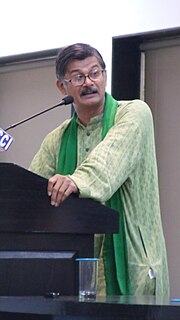
Sunilam, formerly known as Sunil Mishra, is an Indian socialist politician, writer, and former physicist. As of the mid-1990s, he served as the national general secretary of the Yuva Janata Dal.
Krishna Pal Singh was an Indian activist, politician and a former governor of Gujarat. His career began in the 1940s and ended in the 1990s.
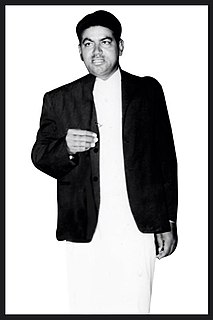
Chaudhary Dilip Singh Chaturvedi was an Indian politician and an eminent lawyer from the central Indian state of Madhya Pradesh. He became a Member of the Legislative Assembly (MLA) of the Madhya Pradesh Legislative Assembly as a Bharatiya Janta Party candidate for the Bhind constituency following the 1980 elections. He was a socialist leader.
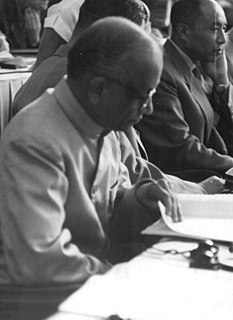
In 1964 a major split occurred in the Communist Party of India. The split was the culmination of decades of tensions and factional infighting. When India became independent in 1947, differences arose of how to adapt to the new situation. As relations between the Nehru government and the Soviet Union improved, a faction that sought cooperation with the dominant Indian National Congress emerged within CPI. This tendency was led by S.A. Dange, whose role in the party hierarchy became increasingly controversial. When the Sino-Indian War broke out in 1962 Dange's opponents within CPI were jailed, but when they were released they sought to challenge his leadership. In 1964 the party was finally divided into two, with the left faction forming the Communist Party of India (Marxist). The split had a lot of regional variations. It also impacted other organizations, such as trade union and peasant movements. The split has been studied extensively by scholars, who have sought to analyze the various domestic and international factors involved.















